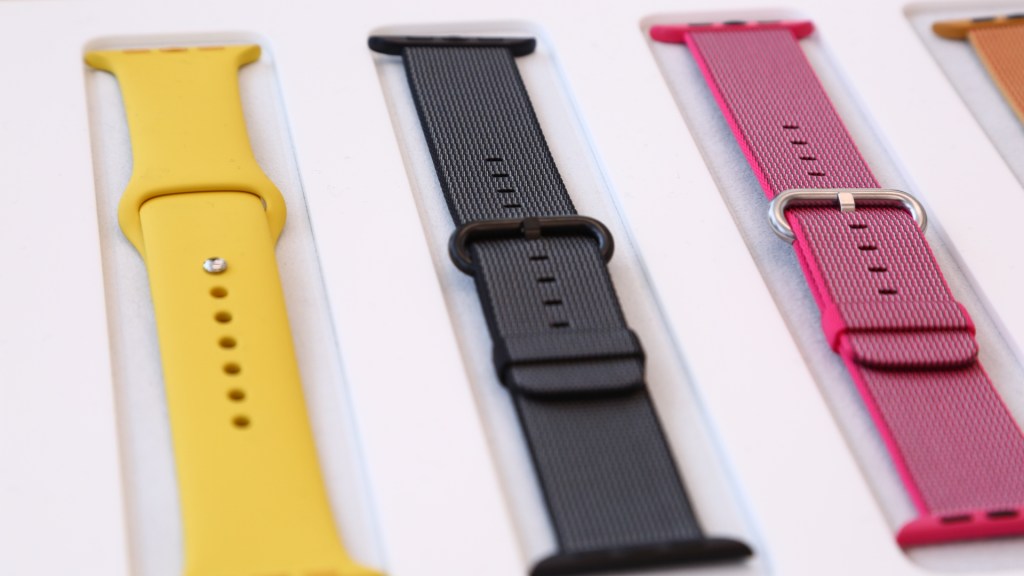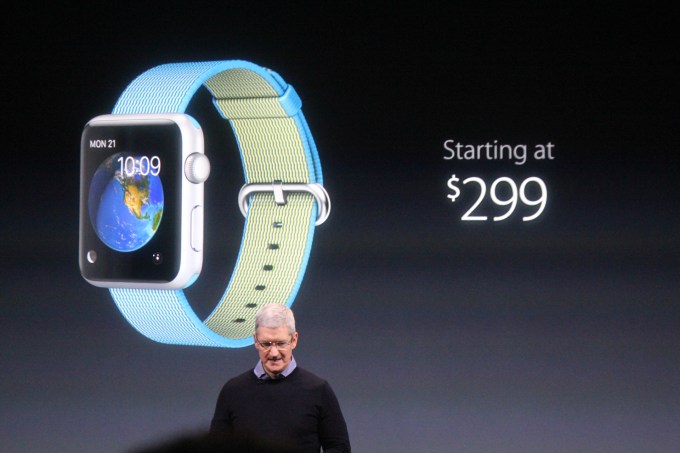Last week Apple co-founder and general all-round-nice-guy Steve Wozniak made headlines via a Reddit AMA in which he was quoted as criticizing the Apple Watch for taking the company into “the jewelry market”.
Typed Woz:
I worry a little bit about – I mean I love my Apple Watch, but – it’s taken us into a jewelry market where you’re going to buy a watch between $500 or $1100 based on how important you think you are as a person. The only difference is the band in all those watches. Twenty watches from $500 to $1100. The band’s the only difference? Well this isn’t the company that Apple was originally, or the company that really changed the world a lot. So it might be moving, but you’ve got to follow, you know. You’ve got to follow the paths of where the markets are.
This week Apple made a few headlines of its own, including its announcement of a $50 price cut of said smartwatch. The new entry level price for picking up Apple’s wearable is $299, for the smaller sized Sports model.
Does that price drop mean Apple has realized it has an expensive dud on its hands and is desperately trying to entice buyers to think otherwise? In a word, no.
The Apple Watch remains the category leader in the smartwatch space. And while the long-term sustainability of ‘lifestyle wearables’ (if I can call them that) remains a matter for debate at this still-nascent stage, it’s fair to say an early price-cut for an Apple device is not unexpected, given the company’s past pricing strategies.
It’s also smart business if you make money off selling an interconnected ecosystem of devices and accessories, as indeed Apple does.
On the price-cut front, the original iPod, for example, cost some $400 at launch in fall 2001. In the following years the price of individual iPod models pretty steadily declined, even as new models launched, enabling Apple to reinstate higher price points for the latest top-of-the-line device. Today you can pick up an iPod nano for ~$150 (or a screenless shuffle for ~$49) — a far cry from the $400 original. And yet these (relatively) cheap and cheerful iPods are still apparently worth Apple’s while to make and sell.
The original iPhone also had a price haircut of $200 mere months after launch back in 2007 — yet that device went on to be a rip-roaring sales success, and continues to be the core engine of Apple’s business even today. So a price-cut, in and of itself, doesn’t tell us very much.
Interestingly, though, in the case of the Apple Watch, Apple has not reduced the prices of the additional Watch bands it sells. So while Apple’s core wearable is now a little cheaper, the Apple-made Watch accessories are holding steady.
CEO Tim Cook yesterday made a point of noting that about a third of Apple Watch users “regularly” change their bands. Which means that around a third of its wearable owners have shelled out for (or been gifted) a second (or additional) band — expanding the profit margin Apple can make from the wearables.
Apple introduced another band yesterday for the entry level Apple Watch; a woven nylon option that it’s also selling separately for $49. Other bands in its range include the $199 Milanese Loop band; a $449 Link bracelet; a $149 Classic Buckle leather band; a $149 Leather Loop band; and a $249 Modern Buckle option. And when you look at the pricing of those Watch band accessories it’s pretty clear where the biggest Apple hardware margins are being made: accessories.
Apple already follows this playbook with cases and dongles, charging frankly eye-watering prices for official connectors, replacement cables, fancy leather iPhone cases or battery-equipped variants, for example.
The Apple Watch, then, is a clear bid to open up a whole new spectrum of accessories — Watch bands — that the company can charge premium prices for.
And the point with these wearable accessories is that people will pay over the odds for personalization. In fact people are far happier to pay for personalization than to fork out a premium for something they probably really need but which won’t be displayed on their person, like a replacement charger cable.
After all, personal preference is the fuel of the fashion industry — and its that impulsive commerce Apple is seeking to tap into via its wearable. No wonder the company dubs the Apple Watch its “most personal device ever”.
So while Woz might talk disparaging about the ‘jewelry market’ — given his geek pedigree it is entirely his right to be dismissive of such fripperies — the chunky price-tags on those fancy Apple bracelets should not be sniffed at as a strategy for Cupertino to eke more mileage out of its hardware business model.
A model that it’s been suggested could be flagging, as the smartphone market saturates, mobile growth rates slow even in massive markets like China and tablet replacement cycles appear stubbornly stuck in far less expeditious orbits. Swappable Watch bands that can snatch the fleet-of-foot whimsy of fashion aren’t chained half so rigidly to the strictures of upgrade necessity — and can therefore turn a profit outside the widening upgrade arcs of consumer electronics devices.
So, by making the Apple Watch a little cheaper, Apple is playing on the psychology of wearable buyers — by not only urging them to adopt its wearable in the first place, but also implicitly encouraging them to spend a little of what they’ve saved on the core device by also purchasing that more expensive band. Y’know, the one they really, really like.
And talking of personal preference, mine is for a pro-privacy consumer electronics company that can afford to take a stand to defend customer data because it makes money off of selling hardware (and, yes, also off of #fashion) vs the other type of tech giant whose business model apparently demands the continual data-mining of users to power ad-fueled revenue.
Seen from that perspective the jewelry market could — after all — contain rather more value and substance for consumer electronics users than Woz’s sideways glancing assessment of its skin-deep surface suggests. Privacy can command its own fashion-type premium too.































Comment